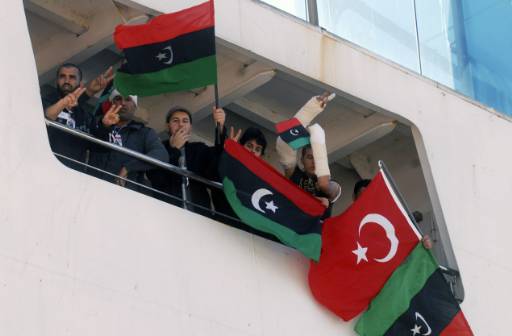By Middle east Monitor
France, Greece, Egypt, and southern Cyprus have denounced the deals signed between Turkey and the Libyan Government of National Accord (GNA), calling them “null and void”.
The declaration was made in a statement issued by the four countries’ foreign ministers yesterday, following a meeting between them in the Egyptian capital Cairo. The Italian foreign minister was also reportedly present at the meeting, but refrained from signing the statement.
The two deals that the group of foreign ministers condemned are those of a military and maritime pact signed by Turkish President Recep Tayyip Erdogan and GNA leader Fayez Al-Sarraj in November 2019, cementing the political and military ties between the two.
In recent months, Turkey has made steps to increase ties and military support for the GNA by signing such pacts on military cooperation and maritime boundaries in the Eastern Mediterranean. The relations have reached such a point that Turkey has offered direct military support through the deployment of troops to the country in order to push back the advances of Brigadier General Khalifa Haftar, which the GNA has accepted and called for.
Turkey’s alliance with and support for the GNA has also benefitted the Republic’s position in the Eastern Mediterranean overall, which was been subject to increased tension last year.
This has alarmed and upset the four countries who made the condemnation yesterday due to Turkey’s dispute with Southern Cyprus over the distribution of energy resources in the Eastern Mediterranean, to which Turkish drilling vessels have been sent to drill for natural gas.
Turkey’s deployment of the drilling vessels since June 2019 came after a deal was struck by Greece, Southern Cyprus and Israel earlier that month, in which the three states agreed to build a pipeline harnessing the reserves of natural gas off the southern shores of the island. This EastMed pipeline, which is estimated to produce a profit of $9 billion over 18 years of the reserve’s exploitation, will supply gas from the Eastern Mediterranean region all the way to countries in Europe.
While the countries who struck the deal – as well as the US and EU – claim that Turkey is harming regional peace and stability by opposing it and making alternative deals with Libya’s GNA, Turkey is firm on its statement that it wants the equal distribution and “fair sharing” of the natural gas and energy resources to all the regional states.
To counter what it sees as an attempted monopoly by those countries in the EastMed deal, Turkey has recently invited the GNA to join it in its exploration operations in the eastern Mediterranean, also aiming to work with international companies to search for the gas and energy resources.
There are signs of reconciliation and understanding emerging between Greece and Turkey, however, with both countries today agreeing to hold regular political consultations with each other, in which bilateral relations, regional and international issues, and that of resource distribution will be discussed.
“In the framework of regular political consultations between the Ministries of Foreign Affairs of Turkey and Greece, talks will be held in Ankara on 10 January 2020 between delegations under the chairmanship of H.E. Ambassador Sedat Önal, Deputy Minister of Foreign Affairs, and H.E. Ambassador Themistoklis Demiris, secretary-general of the Ministry of Foreign Affairs of Greece,” said a statement released by the Turkish foreign ministry today.









